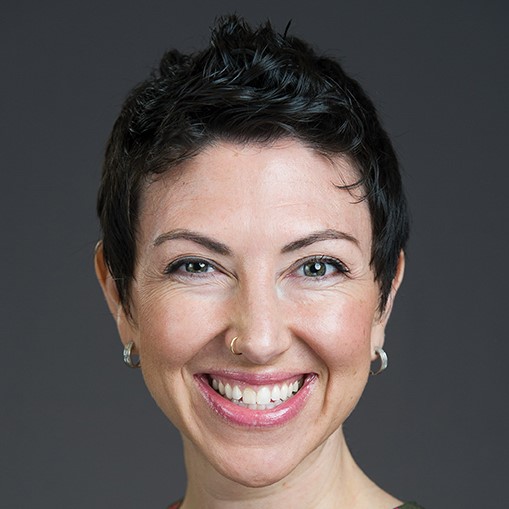Rabbi Lizzi Heydemann
by Sue Tomchin
When Rabbi Lizzi Heydemann, then 30, moved back to Chicago in 2011 after being away for more than a decade, she wanted to connect with contemporaries but didn’t see a ready avenue.
She knew that other Jews in their 20s and 30s were in the same situation. A 2010 study by Chicago’s Jewish United Fund, showed roughly 100,000 Jews lived in the city – a quarter of them under 40 – yet only a very slim minority belonged to a synagogue.
“Having grown up in Chicago, I felt a stake in helping the majority of people who weren’t connected to synagogues discover and reimagine Judaism and what it could bring to their lives,” she says.
During the “wilderness period between the end of college and whenever ‘settling down’ happens,” Rabbi Heydemann says, “there is a lot of space where people are searching, looking for a sense of stability, community, people to sing with, have dinner with, share values with, learn with, and fall in love with.”
Like an entrepreneur, she considered her potential audience and created a place that speaks to its needs. She named the place Mishkan, after the “DIY sacred revival tent that the Israelites carried with them through the desert, creating holy space wherever they stopped to gather in it.”
“I wanted to create an environment in which Judaism is invigorated and something without which people don’t want to live, a place where people find connection, joy and purpose,” Rabbi Heydemann says. She wanted this space to be “radically inclusive,” so that “you don’t have to leave part of yourself at the door, because you don’t think that part of you is welcome in a Jewish space.”
Using a tech-world tactic, she focused on the user experience. “I’m concerned about the person who is ambivalent about or has given up on Jewish practice, and who, if they don’t find a parking space, will keep driving and not come in,” she says. “I try to reduce every barrier.”
People aren’t inclined to travel far, so Mishkan holds gatherings in spaces in across the city. And since many are put off by synagogue dues, Mishkan offers options for levels of support set up as “a monthly donation more like a gym membership.” Once people walk in Mishkan’s door, the experience is robust and intensely meaningful, encompassing prayer, social activism, and community building through informal gatherings outside of services. Rabbi Heydemann also doesn’t use “insider” Jewish language since her target audience is “on the outside of the Jewish calendar and Jewish institutions.”
Mishkan also sponsors Maggie’s Place, a holistic wellness center where individuals meet, often over dinner, to discuss issues and learn with social service leaders. Two years ago, Mishkan added the Mensch Academy – “inspired, down-to-earth Judaism for kids and families.”
Twice-a-month Friday night Shabbat services are “rhythmic, ecstatic and joyful, with moments for personal reflection, for silence, and for learning.” Dinner follows “since part of the Shabbat experience is eating together.”
High Holiday services – in 2017 over 1,800 attended – are interactive. While “many people are used to religion being something that is performed for you or at you,” at Mishkan, she notes, “you don’t feel like you are an audience member so much as in a learning and prayer experience in which your voice matters.”
“I’m concerned about the person who is ambivalent about or has given up on Jewish practice, and who, if they don’t find a parking space, will keep driving and not come in. I try to reduce every barrier.”
Heydemann discovered her own Jewish voice growing up in Hyde Park, a progressive neighborhood bordering University of Chicago. At the nearby Reform synagogue, she met Rabbi Arnold Jacob Wolf, who became an early mentor. “I did not come from a family in which Jewish practice was a native language or experience,” she says. “Rabbi Wolf taught me to take myself seriously as a voice within Jewish tradition.” When she came home from college, “the two visits she card most about making” were to her grandmother and Rabbi Wolf.
Her paternal grandparents had escaped Germany in the late ‘30s and, in school, Heydemann excelled in the study of the German language. She spent four summers with families in Germany, and studied German at the University of Chicago. Ultimately, she recognized that there was “something deeper inside that transcends the particular country where my grandparents happened to have lived. I understood then that Judaism was at the core of who I am.”
Before attending Stanford, she did a gap-year program in Israel and, as a college freshman, took part in an American Jewish World Service trip on which she encountered two “young, progressive and intellectually rigorous” female rabbis, whom she could “relate to as women and role models.“
After Stanford, Rabbi Heydemann attended The Ziegler School of Rabbinic Studies, the Conservative seminary in Los Angeles, and apprenticed under former JWI Woman to Watch, Rabbi Sharon Brous, founder of IKAR in Los Angeles. Mishkan, like IKAR, is part of the Jewish Emergent Network, seven entrepreneurial spiritual communities across America.
Over the past seven years, Mishkan has impacted thousands of lives. Seven young adults who became involved decided to go to rabbinical school and people repeatedly tell Rabbi Heydemann that, “for the first time, they are showing up for services regularly as adults.”
She has performed weddings for seven couples who met there and first met Henry, her husband, at Mishkan, though they grew up in the same neighborhood. They now have a one-year-old, Judah Lev.
“Mishkan," says Rabbi Heydemann, “became much bigger than even anything I had hoped for or imagined.”















